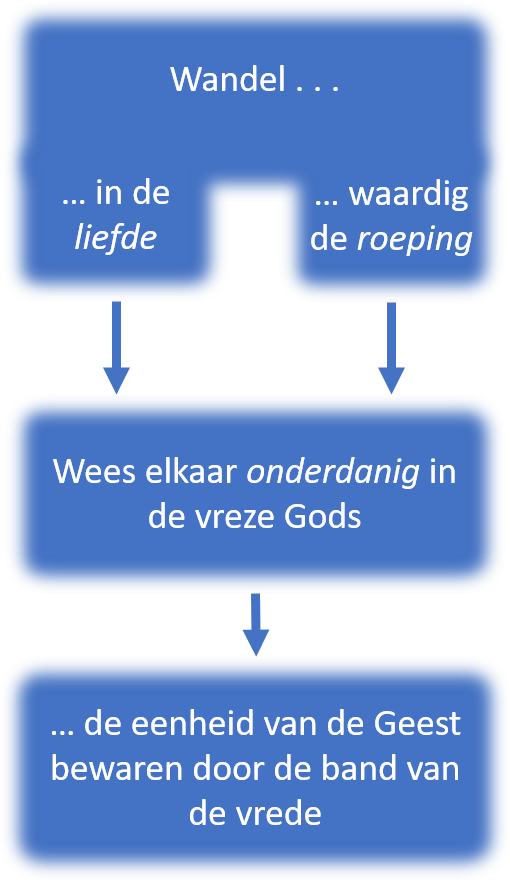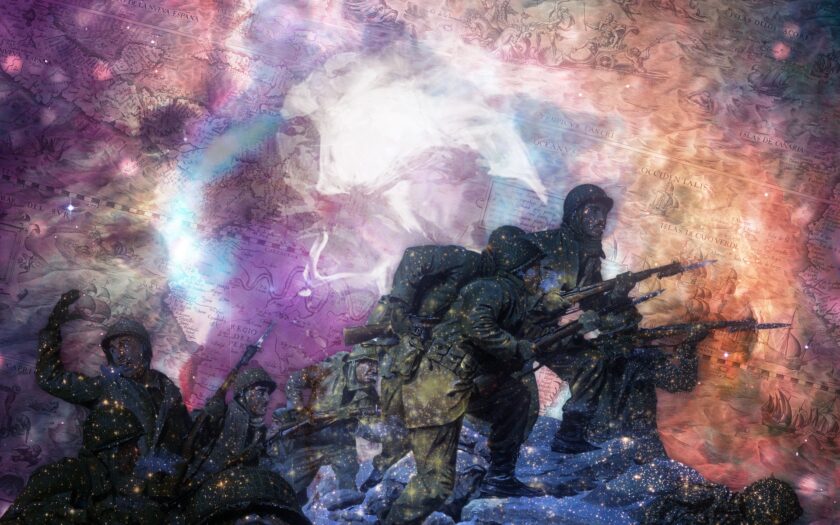This article cuts through the letter to Ephesus. But don't expect a complete treatise on the letter.
In summary, it is about:
It begins with God's mysteries, His eternal purpose in Christ. The church has a special place in it and for the here and now a commission, a calling. It demands submission as a central characteristic of life in the congregation (and beyond). It is the only way to keep the peace and unity of the Spirit. That produces a spiritual battle for which it is necessary to be strengthened in the Lord and in the strength of His might.
There is a spiritual battle that a Christian has to fight, as reflected in Paul's letter to the Ephesians. The letter itself makes clear why this struggle is there and with whom. In this blog we will not deal with the entire letter of Ephesus, but will highlight a common thread with regard to the battle with the powers in the heavenly places. A kind of exploration.
“10 Further, my brethren, be strong in the Lord and in the strength of his might.
11 Put on the whole armor of God, that you may be able to stand against the wiles of the devil.
12 For we wrestle not against flesh and blood, but against principalities, against powers, against the world rulers of the darkness of this age, against the spiritual powers of evil in the heavenly places.
13 Therefore take up the whole armor of God, that you may be able to withstand in the day of evil, and after having done all, to stand.
14 Stand therefore, your waist girded with truth, and clothed with the breastplate of righteousness,
15 and feet shod with the preparation of the gospel of peace.
16 Above all, take up the shield of faith, with which you will be able to quench all the fiery darts of the evil one.
17 And take the helmet of salvation and the sword of the Spirit, which is the word of God,
18 while on every occasion you pray in the Spirit with all prayer and supplication, and watch therein with all perseverance and supplication for all the saints.”
(Ephesians 6:10-18)
The whole armor of God
The whole armor of God - the expression is there twice and it is remarkable that it refers to the whole armor and it is the armor of God. The first (the whole) indicates that it belongs together and that we cannot miss a piece of equipment. The second indicates that it is God's armor. Not that God is wearing armor that He now also gives to us or anything, but in the sense that that armor comes from God. He conceived it and 'put it together'; it's not something that we as humans can come up with on our own.
People can come up with a lot – and of course, the intention is good, but it will always turn out to fail. The catechism or creeds are not enough, and some equipping of a part of the congregation will not deter the devil so much. If we want to withstand the wiles of the devil, we can do nothing but put on the armor of God. Moreover, every believer will have to do that: it says 'brothers', that means everyone in Ephesus must equip themselves with God's armor.

Because there is a battle to fight. Not that we are looking for it, but it is, as it were, forced on us and we are confronted with it. It is noteworthy that there is three mention of 'standing' (verses 11,13 and 14). So it is not a battle in which we have to attack and eliminate opponents. But we are being attacked and then we must not let ourselves be blown down, but stay upright and hold our ground.
The opponent
There are those who try to deceive us "with empty words" (Ephesians 5:6). But we are not fighting with people, but against what is behind them. Verses 11 and 12 make it clear:
“(…) that you may be able to stand against the wiles of the devil. For we do not wrestle against flesh and blood, but against principalities, against powers, against the world rulers of the darkness of this age, against the spiritual powers of evil in the heavenly places..”
Ephesians 6:11,12
The real adversary is the devil with his powers. They are the principalities and powers, spiritual powers of evil in the invisible world. This is not just a designation of "evil" in some mystical form, so that you could take these verses as some general "battle between good and evil." But these are indeed spiritual beings, who were once created by God, but who rebelled and went after Satan (see for example Isaiah 14:12-14). They try to seduce the people, led by the devil himself. And the believers are also his target.
His weapon - crafty temptations
It says the devil is trying to get us down with 'cunning temptations'. That is one word in the original, which only appears in Ephesians 4:14. If you search for the meaning of the word, you will come across concepts such as 'method', 'craft and deceit', but also 'journey' or 'way'. I interpret it as such that we, believers, are offered a path that you can follow, or also another way of 'experiencing your faith', which presents itself beautifully, but which in the meantime is a great deception. Examples are
- You can begin to experience the Bible more when you do so in the manner of the 'Lectio Divina';
- You can experience the Spirit when you are first baptized in the Spirit or when hands are laid on you,
- and more such views and teachings that tempt us to take the 'contemplative way' or the 'charismatic way'.
Paul calls it 'crafty temptations' and they come from the devil. When we go into it, we fall into his trap. That is why we must stand.
The heavenly realms
The forces that fight us, the 'spiritual powers of evil', are in the heavenly places. 'Heavenly realms' means something like 'heavenly realms', 'heavenly realms'. It's the invisible world where
- our spiritual blessings are located; “Blessed be the God and Father of our Lord Jesus Christ, who has blessed us with every spiritual blessing in the heavenly places in Christ, . . .” (Ephesians 1:3)
- Christ is at God's right hand; “(…) when He raised Him (Christ) from the dead and seated Him at His right hand in the heavenly places” (Ephesians 1:20)
- we too are placed in Christ; “He raised us up with [Him] and set us with [Him] in the heavenly places in Christ Jesus." (Ephesians 2:6)
- also the spiritual powers of evil reside; “the principalities and powers in the heavenly places” (Ephesians 3:10) and “” the spiritual powers of evil in the heavenly places” (Ephesians 6:12).
It is remarkable; our spiritual blessing that we have received in Christ is there, but also Christ Himself through Whose work and His glorification God was able to give us that blessing. Furthermore, we ourselves are also placed there, that is, spiritually we have access to Christ and the blessings associated with Him. But also there - and this is the contrast - in that invisible world are the powers of evil, against whom we have the battle (Ephesians 6:12).
Christ far above all powers…
Fortunately we read in 1:20 that God “raised Christ from the dead and set down at His right hand in the heavenly places, far above all principality and might and power and dominion and every name that is named, not only in this world, but also in the world to come…”.
When it comes to the battle we have to fight, there is that tremendous encouragement that the Lord Jesus has been set by God at His right hand in a place far above all powers imaginable!
Christ is placed above all powers, which are the powers that are in rebellion against Him and His authority. The powers - "spiritual powers of evil" as they are also called - that also wage battle against those who are Christ's, His church.
This is indeed a special situation: Christ placed above all 'powers of evil' as I briefly call them, and the Church as the body of Christ (Ephesians 1:22,23). The powers of evil are impotent when it comes to Christ who is above them. But the body, the church, they will fight with fire and sword – with 'cunning temptations' as they are called (Ephesians 4:14 and 6:11).
We are now trying to find out why this struggle exists.
The mystery and the community of the mystery
The letter to the Ephesians makes it clear that God's desire is that 'in the fullness of the times all things will be gathered together again in Christ, both in heaven and in earth' (Ephesians 1:9 and 10). God desires - it is His good pleasure that He had purposed in Himself - that a time will come when it will be seen that Christ is Lord and Head of everything and that everything, both in heaven and on earth, is subordinate to Him in harmony. He calls that 'the mystery of His will' (1:9) and Paul was chosen by God to make this mystery known (see, for example, Ephesians 3:2-7).
But there is something more to this mystery and that is what we read in Ephesians 1:11, namely that we, the church, participate in this mystery. Or as Paul says, we have there'got an inheritance in' (translation Telos, KJV). At the end of the chapter it is said in a different way:
“And He put all things under His feet and gave Him as head over all things to the church, which is His body and the fulfillment of Him who fills all in all..”
Ephesians 1:22-23
God has already subjected all things to Christ. That is already the case, although we do not yet see it (Hebrews 2:8). But Christ is now also head of His body, the church.
You could say that there are two 'mainships':
- Christ head over everything
- Christ head of His body, the church.
The first is not yet visible, although it is, but the second is visible. At least it should be visible. The church of Christ should show joint submission to Christ. That is exactly the task we have as municipality(s). In this same Ephesian letter we read the following:
“(…) what is the fellowship of the mystery which has been hid from ages past in God, who created all things through Jesus Christ, 10 that now through the church the manifold wisdom of God might be made known to the principalities and powers in the heavenly places, 11 according to the eternal purpose which He made in Christ Jesus our Lord.”
Ephesians 3:9-11
What I understand from this is that the church is already showing the evil powers in the heavenly places how it is that the church together[1] subject to Christ. The church thereby makes known to them the manifold wisdom of God of His eternal purpose in Christ, namely, that He should be Head over “everything that is in the heavens as that which is on the earth” (1:10).
A 'message' to the principalities and powers in the heavenly places
The unity with and subjection of the church to Christ is plain language for the principalities and powers in the invisible world. It is a message that they understand and that makes it clear to them that soon everything in heaven and on earth will be gathered in Christ.
That this is God's purpose for the church is part of 'the mystery of God's will' (1:9) and also becomes 'the community to the mystery' (3:9). It is something very special, which receives little attention and which we hardly think about.
The authorities and powers that receive this announcement by the municipality are so to speak 'not happy with it'. It reminds them that they will eventually lose out with their superior, the devil. And that explains that they will try incessantly to separate the church from its Head. After all, if that were to succeed, God's ultimate purpose could well be undermined (they no doubt think).
It is no wonder that from the beginning of the church they have been busy dividing the church in every possible way and separating it from the Head. We see the result after 2000 years of Christianity all around us and you can't help but notice that it has become a big mess. Most of Christendom has entered the idolatry of contemplation and of the charismata. What is left crumbles further and further and little remains. How are you supposed to stay upright? In chapter 6, Paul lists the armor of God that we must put on to stand. We'll come back to it at the end.
Our walk
How can we show the principalities and powers in the heavenly places how God intended the church as the body of Christ? Chapters 4 to 6 give us the answer to this question. This is about 'our walk', the practical and visible elaboration of that which is set forth in the first 3 chapters as 'our calling'. Both chapter 4 and chapter 5 begin with 'the walk':
"(…) a walk who is worthy of the calling to which you were called, in all humility and meekness, with patience, bearing one another in love . . .”
Ephesians 4:1 and 5:2
"(…) and walk in love, just as Christ also loved us . . .”
What is set forth in the last three chapters is set a number of times against what we might call "your former walk." The indications relate to the personal life of the believer and to the life in and of the congregation.

Worthy of the calling
It begins with the important verses at the beginning of the fourth chapter.
“Thus I (...) call you to a walk which calling with which you were called, being worthy, in all humility and meekness, with patience, bearing one another in love, and being diligent to keep the unity of the Spirit through the bond of peace: one body and one Spirit, as you also are called to one heap of your calling (…)”
Ephesians 4:1-4
In my opinion, these texts are crucial; Paul's call begins and ends with our 'calling ' (verses 1 and 4) and is therefore connected to the first three chapters, which are about exactly what God has called us to (see for example 1:18). In short, we are called to show unity as a church under Christ, under His headship. That will become apparent when He will be revealed; that is future and is "the hope of the calling" (1:18; 4:4). But already now our common walk must show the same: together a unity under Christ.
The core of that calling is that every believer demonstrates in the practice of life that he is under the direct authority of Christ. In addition, they show the same in the church: together we also stand in unity under the direct authority of Christ. That's a 'walk worthy of the calling. The Lord Jesus Christ is our common Head, we are all members of His body and we walk according to what He says.
Now we can easily say that we are under the direct authority of Christ, our Head, but the question is, of course, how you translate that into practical behavior in the church. How does that become visible and how can you test it? Well, for that we have to go back to 'the calling' in which, as we have seen, the word 'submissive'[2] (or 'subject') plays the main role.
Walk in love
Before we go into the concept of 'submission', let's talk about that other walk mentioned at the beginning of chapter 5.
“Therefore be imitators of God, as beloved children, and walk in lovejust as Christ also loved us and gave Himself up for us as an offering and sacrifice, of a pleasing odor to God.”
Ephesians 5:1,2
We are called to be 'imitators of God'; that is, like Him to efface (give away) yourself for the other. Even for us who were "children of wrath" (2:3), He has done that. The Lord Jesus also showed the same divine love by 'To surrender for us '. When we are called to walk in love, God Himself is our example.
You can see that there are serious problems in a Christian community and as the solution it is seen that 'we should love one another more'. That sounds nice, but it won't help. Because what does that manifest itself in? Here too we must again ask the question in which a 'walk in love' manifests itself and how this becomes visible in practical interaction.
Submission
In my opinion, it is not without reason that 'submission' is discussed several times in chapters 5 and 6.
- “Be subject to one another in the fear of God.” (5:21)
- “Wives, be subject to your own husbands, as to the Lord, . . . Therefore, as the church is subject to Christ, so also women ought in all things to be subject to their own husbands.” (5:22,24)
- “Children, obey your parents in the Lord, for that is right.” (6:1)
- “Slaves, as to Christ, be obedient to your master according to the flesh, with fear and trembling, upright in heart, . . .” (6:5)
Children and slaves are told to obey and, of course, that includes submission. But both are under the formal authority of parents or employer, who can enforce this with their authority if necessary.
But that is not the case in the church (just like in marriage). There submission is demanded, without obedience being demanded or enforced[3]. Everyone should be submissive to the others and no one can assert authority. That is precisely the mark of the church of Christ, because every member of that body is directly under the Head Himself.
When we're told we'd walk'worthy of the calling' (4:1,2) and 'in love' (5:2) then submission is its common feature. A 'walk in love' has not to do with how much I am willing to give for another, but how I relate to that other in submission. Submission is easy when everyone agrees. But if there are different views, then submission to each other is an almost impossible task. Yet God's Word also points the way in this, I think (see here).
Then we also walk according to our calling, so that we'in all humility and meekness, with patience, bearing one another in love, and endeavoring to keep the unity of the Spirit through the bond of peace' (4:2,3).

Submission, then, is the key to maintaining unity and peace in the body of Christ and keeping us united to Christ. It is the most difficult task for the faithful, but also the most beautiful. For only in this way does the unity under Christ become visible as God intended it to be. So that in this way we can also make known the manifold wisdom of God to the principalities and powers in the heavenly places.
The armor
Finally, there is still some armor to put on. For without that armor submissiveness is impossible. The portion of the armor begins with the encouragement
“Further, my brethren, be strong in the Lord and in the might of His might”.
Ephesians 6:10
We don't wear the armor to be a great warrior ourselves, but that we find our strength only in the Lord and realize that He has the power, as also stated in the first chapter: “(…) the exceeding greatness of His power to us who believe, according to the working of the strength of His mightwhich He wrought in Christ, when He raised Him from the dead and seated Him at His right hand in the heavenly places, . . .” (Ephesians 1:19,20). His mighty resurrection power is available to us who believe, how wonderful is that! The strength of His might can only be effective when we, for our part, put on the whole armor of God.
The means girded with the truth
We gird ourselves with the truth of God's Word, whereby we can also live sanctified, which is set apart from the world (John 17:17,19).
Clothed in the breastplate of righteousness
We stand right before God only because of the work of the Lord Jesus Christ. Through faith in Him, God imputes His righteousness to us (Romans 4:6). Not our own deeds! “Not of works, lest any man should boast” (Ephesians 2:9)
Feet shod with the readiness of the Gospel of peace
Willingness to "account to everyone for the hope that is in us" (1 Peter 3:15), so that we can share the gospel of peace in a world bursting with discontent.
Above all, take up the shield of faith
Here it says 'above all' it is probably the most important piece of equipment. After all, in all things 'faith' is the most important. The arrows of the evil one are aimed at setting our faith on fire and making us rely on 'experiences'. But we walk by faith, not by sight (2 Corinthians 5:7).
The helmet of salvation
The helmet protects our head, our thinking from which our lives are governed. We must not allow that to be influenced by the opponent. We will have to be aware of the salvation, the salvation that God has given us. That which we have already received and the inheritance that we will receive later.
The sword of the Spirit, that is God's Word
We must not reach out to the Spirit, but to the Word of God. Then God's Spirit will be able to use that and work in hearts to the honor and glory of God. The Spirit of truth (John 14:17; 15:26) Who applies the Word of truth (Ephesians 1:13). And that brings us back to the beginning.
We have a calling as believers together to show the powers in the invisible world what it is to be joined in unity to our Head, Christ. Submissiveness to one another is the most important and difficult necessary condition for this. The devil will try to turn us away from our calling, but to stand firm in this battle we have been given armor from God. So that we do not have to expect it from ourselves but "be strengthened in the Lord and in the might of His might" (Ephesians 6:10)
Footnotes
[1] That the congregation is seen as a unit is especially clear from the fact that both Jews and Gentiles are included in the congregations. The enmity that existed between them has been dissolved in the church. “For He is our peace, who has made both one” (Ephesians 2:14). We will not elaborate on that point in this article.
[2] Strong G5293 - hypotassō. 1. To set under, subordinate 2. Submit 3. To submit to, obey 4. To submit to someone's rule 5. Heeding one's admonition or counsel 6. Obey, submit [A Greek military expression meaning '[divisions of troops] placed militarily under the command of a leader'. In non-military usage it was "a voluntary attitude of conforming, cooperating, accepting responsibility and bearing a burden"].
[3] We have written about authority, humility before. See here and here and the sub-pages.



